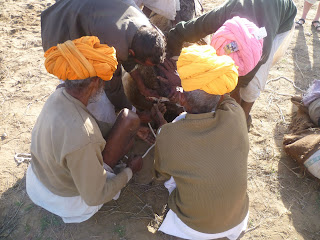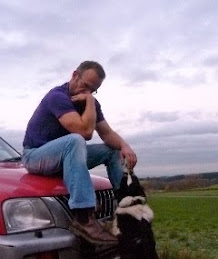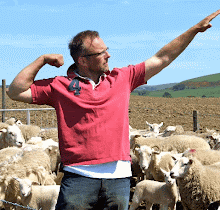It’s been a while but I better finish what I started.
Before I left for Norfolk I had actually given Tim a rest from my dull chat in order to go and see David Sullivan. David has been - for a few years now - this mythological figure in my brain. John Vipond, SAC’s sheep specialist, credited him for a lot for ideas and even in my mock Nuffield interview it was suggested that I should go and see the guy.
David lives in Hampshire surrounded by pretty thatched cottages. He owns his house but has never owned any other piece of land. His view is that no one really “owns” land they just own a piece of paper that says they own it. He has never wanted to own land ... just farm it.
He 70 years old and has a tangible gentleness to him. It is the first visit in 15 months of my Nuffield Scholarship where we say grace before we eat. He and his wife were childhood sweet hearts and there was never going to be anyone else for either of them.
 |
| David and Eileen Sullivan |
With the exception of “Hello”, the first words David said to me were “There are no problems, only solutions”. This appears to be the definition of how he has lived his farming life.
Brought up in the town, his father arranged for a local farmer to give him horrible jobs as a child with the instructions “knock it out of him”. This was in reference to David’s obsession with farming. It didn’t work.
He was a shepherd and manger until he was 38 and had a further 6 years managing the farm of a philanthropic gentleman. In these six years, working in unison, they moved toward a share farming system. The agreement was he could build up 25% of the flock in his ownership. The owner would have allowed him more but this level was what David deemed fair. Integrity is everything for David Sullivan.
The next step was to expand. He asked his local landlord if he could rent some land. The landlord said no. Importantly David asked him “why not?”. The issue was security of tenure. David went away to find a solution to his limiting factor. If the landlord owned half the stock then security of tenure was not an issue. Over the next few years, David developed the share farming concept on his own, without realizing there were similar agreements elsewhere in the world. He created a local sub culture, with his original landlord’s neighbours joining in. He had land and stock coming out his ears. He had approaches from the City, as he was achieving 25% return on capital for his investors.
Without doubt he created his own opportunities. In doing so he placed significant importance on his natural way with people. He is a character, he does things differently and has a great sense of humour. He saw it as vital, whilst marketing yourself to gain opportunity, to “have a bit of style”, to do things differently with humour and to tell a story.
David was the first to develop share farming in the UK, the first to May lamb and the first to drift lamb. He was an innovator as well as a character. He had really testing times but saved himself by his history of integrity and his determination to find solutions.





























